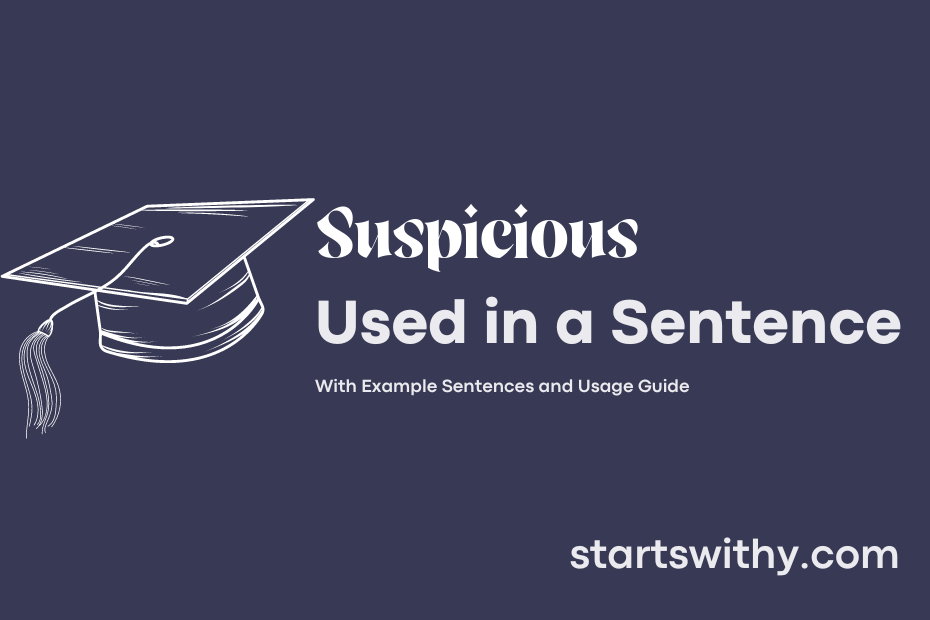Have you ever come across a sentence that made you raise an eyebrow and question its credibility? When a statement seems dubious or not quite right, it might be described as “suspicious.”
“Suspicious” is an adjective that signifies a feeling of doubt or distrust towards something, often due to a lack of clarity, inconsistency, or evidence. It denotes a sense of caution or wariness in regards to the truth or validity of a statement, action, or situation.
7 Examples Of Suspicious Used In a Sentence For Kids
- I saw a suspicious shadow in the dark last night.
- The strange noise coming from the closet sounded suspicious.
- The way the cat was staring at me seemed suspicious.
- My brother’s sneaky smile made me feel suspicious.
- The old house on the corner looked suspicious because it was abandoned.
- A loud knock on the door made me feel suspicious of who it could be.
- The missing cookies from the jar made me feel suspicious of my little sister.
14 Sentences with Suspicious Examples
- Suspicious of the sudden change in behavior, I decided to confront my roommate about his late-night activities.
- My classmates looked suspicious as they whispered to each other during the exam.
- The professor’s decision to cancel the test at the last minute seemed suspicious to many students.
- I found it suspicious that my project partner kept avoiding meetings and deadlines.
- The new student’s constant tardiness made him seem suspicious to the rest of the class.
- I overheard a suspicious conversation between two students discussing leaking midterm questions.
- The sudden disappearance of important study materials raised suspicious questions among the students.
- The unsolicited offers of help from a stranger in the library seemed suspicious to me.
- The unusually high number of students absent on the day of the surprise quiz was seen as suspicious by the professor.
- I felt suspicious about the new app our classmates were using to share notes, as it seemed too good to be true.
- The constant technical issues during online classes seemed suspicious to many students.
- The drastic change in a classmate’s grades from failing to top of the class raised suspicious concerns among everyone.
- The frequent power outages on the day before exams felt suspicious to the students, hinting at possible foul play.
- The overflowing trash cans near the office of the HOD raised suspicious eyebrows among the students wondering about the lack of cleanliness.
How To Use Suspicious in Sentences?
To use the word Suspicious in a sentence, first identify a situation where you feel doubt or uncertainty about someone or something. For example, “I felt suspicious when I noticed my coworker acting secretive around the office.”
Next, place the word Suspicious in your sentence in a way that conveys your feelings of doubt or mistrust. Make sure to use it to describe a person, action, or situation that seems questionable or untrustworthy. For instance, “Her sudden change in behavior made me even more suspicious of her intentions.”
Remember to consider the context of your sentence to ensure that Suspicious accurately captures your feelings of uncertainty or mistrust. You can also modify the word to fit different tenses or forms, such as Suspiciously for an adverb, or Suspicion for a related noun.
By incorporating the word Suspicious into your sentences, you can clearly communicate your doubts or concerns about a person or situation. Practicing using Suspicious in different contexts and forms can help you become more comfortable with incorporating it into your everyday vocabulary.
Conclusion
In conclusion, it is important to be cautious and attentive to sentences containing suspicious elements. These red flags could include ambiguous language, lack of credibility, or unrealistic claims. By identifying and scrutinizing sentences with suspicious characteristics, individuals can protect themselves from misinformation, scams, or potentially harmful situations.
Remember that critical thinking and verifying information are essential in navigating today’s digital landscape. Taking the time to analyze and question sentences that raise suspicion can help individuals make informed decisions and avoid falling for deceptive tactics. Stay vigilant and trust your instincts when encountering sentences that seem dubious or too good to be true.



